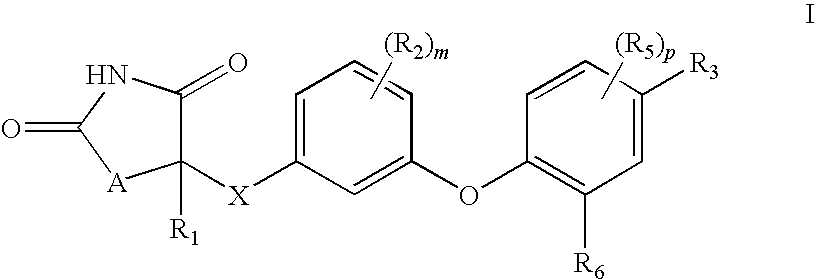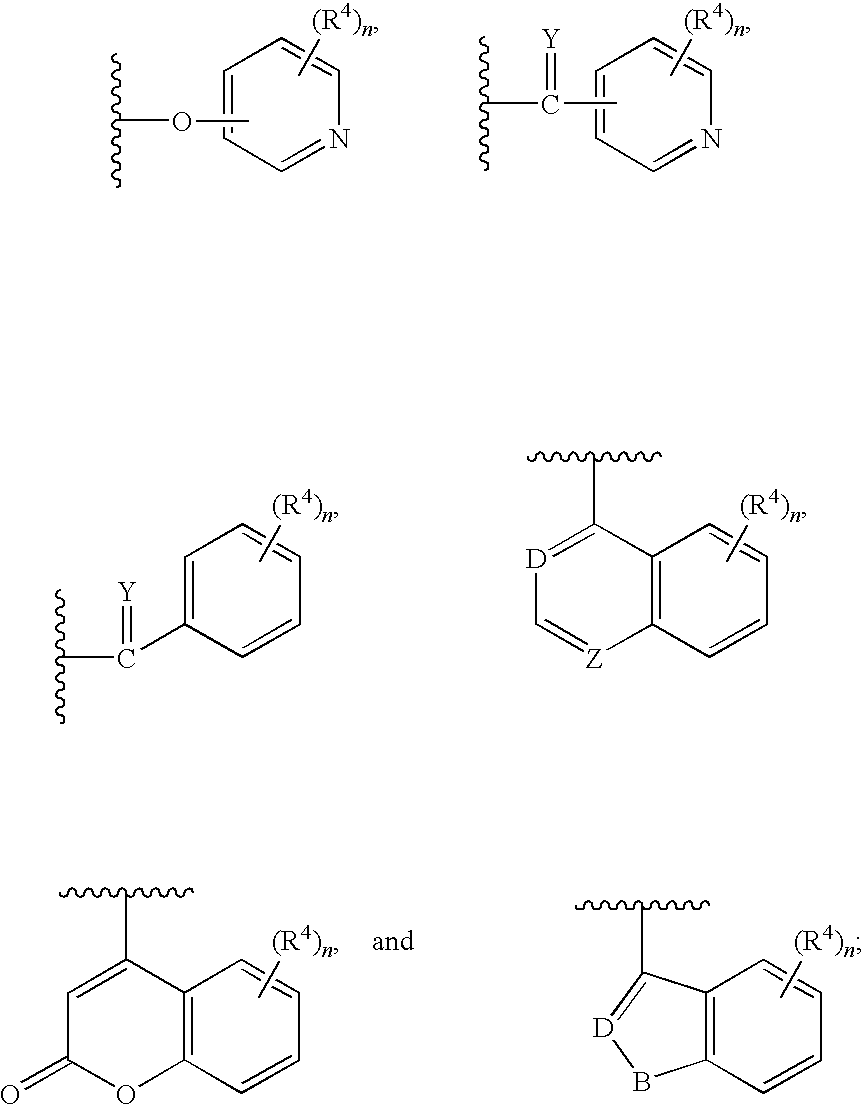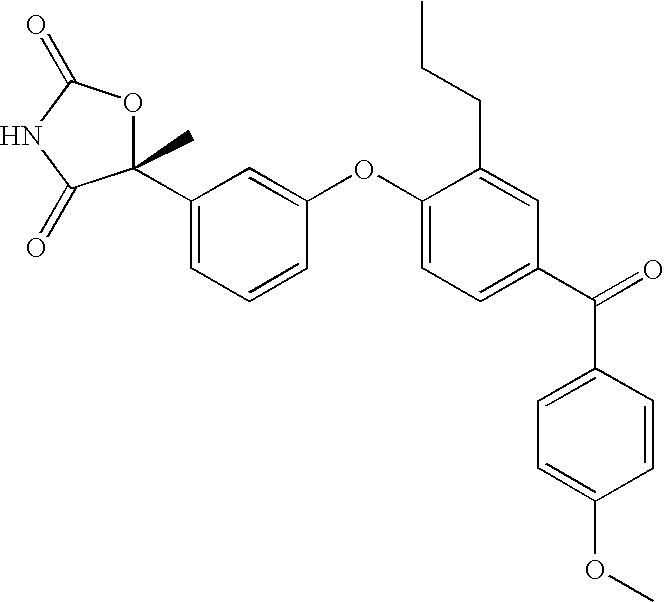Antidiabetic oxazolidinediones and thiazolidinediones
a technology of thiazolidine and oxazolidine, which is applied in the field of phenoxyphenyl and phenoxybenzyl oxazolidine2, 4diones and thiazolidine2, 4diones, can solve the problems of inadequate insulin-mediated repression of lipolysis in adipose tissue, glucose production and secretion in the liver, and insufficient insulin-mediated activation of uptake, oxidation and storag
- Summary
- Abstract
- Description
- Claims
- Application Information
AI Technical Summary
Benefits of technology
Problems solved by technology
Method used
Image
Examples
example 1
(5R)-5-{3-[4-(4-Methoxybenzoyl)-2-propylphenoxy]phenyl}-5-methyl-1,3-oxazoline-2,4-dione
[0224]
Step 1. Preparation of 3-[4-(4-methoxybenzoyl)-2-propylphenoxy]acetophenone
[0225]A mixture of intermediate 12 (2.7 g, 10 mmol), 3-acetylphenylboronic acid (4.9 g, 30 mmol), copper acetate (2.7 g, 1.5 mmol), triethylamine (6.8 mL, 50 mmol) and 4Å molecular sieves (7 g) in dichloromethane (80 mL) was stirred at 25° C. under air. After 16 h, the reaction mixture was diluted with diethyl ether (240 mL) and filtered through a short path of silica gel. The filtrated was concentrated and the residue was purified by chromatography on silica gel eluting with 1:9 ethyl acetate:hexane to afford the title compound.
Step 2. Preparation of (2R / S)-2-hydroxy-2-{3-[4-(4-methoxybenzoyl)-2-propylphenoxy]phenyl}propionamide
[0226]To a solution of the product from step 1 (1.9 g, 5.0 mmol) and a catalytic amount of zinc iodide (80 mg, 0.25 mmol) in dichloromethane (50 mL) was added trimethylsilyl cyanide (1.3 mL, ...
example 2
(5S)-5-{3-[4-(4-Methoxybenzoyl)-2-propylphenoxy]phenyl}-5-methyl-1,3-oxazoline-2,4-dione
[0231]
[0232]Using the procedure of Example 1, step 4, the title compound was prepared from (5S)-2-hydroxy-2-{3-[4-(4-methoxybenzoyl)-2-propylphenoxy]phenyl}propionamide, which was obtained as the early fraction from the chiral separation described in Example 1, step 3.
[0233]1H NMR (500 MHz, CD3OD) δ 7.80 (d, J=8.5 Hz, 2H), 7.71 (d, J=2.5 Hz, 1H), 7.58 (dd, J=8.5 Hz, 2 Hz, 1H), 7.47 (t, J=9.0 Hz, 1H), 7.36 (d, J=9.0 Hz, 1H), 7.20 (t, J=2.0 Hz, 1H), 7.06 (d, J=8.5 Hz, 2H), 7.05 (dd, J=7.0 Hz, 2.0 Hz, 1H), 6.91 (d, J=8.5 Hz, 1H), 3.90 (s, 1H), 2.71 (t, J=8.5 Hz, 2H), 1.88 (s, 3H), 1.71 (m, 2H), 0.97 (t, J=8.5 Hz, 3H).
[0234]MS (ESI, m / z): 459.9 (M+1).
example 3
(5R)-5-{3-[4-(4-Chlorobenzoyl)-2-propylphenoxy]phenyl}-5-methyl-1,3-oxazolidine-2,4-dione
[0235]
[0236]Intermediate 4 (0.33 g, 1.0 mmol) and p-chlorobenzoic acid (0.24 g, 1.5 mmol) were dissolved in triflic acid (3.0 mL). The resulting deep orange solution was stirred at 25° C. for 2 h. The reaction mixture was then diluted with ethyl acetate and poured slowly into ice. The organic layer was separated and washed successively with brine and aqueous NaHCO3. After removal of the solvent, the residue was purified by preparative reverse-phase HPLC to give the title compound.
[0237]1H NMR (500 MHz, CD3OD) δ7.74 (d, J=8.4 Hz, 2H), 7.73 (d, J=2.4 Hz, 1H), 7.56 (dd, J=8.4, 2.4 Hz, 1H), 7.53 (t, J=8.4 Hz, 2H), 7.35-7.40 (m, 2H), 7.21 (t, J=1.8 Hz, 1H), 6.95 (ddd, J=8.4, 2.4, 1.8 Hz, 1H), 6.84 (d, J=8.4 Hz, 1H), 2.72 (t, J=7.2 Hz, 2H), 1.71 (s, 3H), 1.69 (m, 2H), 1.96 (t, J=7.2 Hz, 3H).
[0238]MS (ESI, m / z): 463.9 (M++1).
[0239]The title compounds of Example 4 through Example 19 were prepared follow...
PUM
| Property | Measurement | Unit |
|---|---|---|
| volume | aaaaa | aaaaa |
| concentrations | aaaaa | aaaaa |
| pH | aaaaa | aaaaa |
Abstract
Description
Claims
Application Information
 Login to View More
Login to View More - R&D Engineer
- R&D Manager
- IP Professional
- Industry Leading Data Capabilities
- Powerful AI technology
- Patent DNA Extraction
Browse by: Latest US Patents, China's latest patents, Technical Efficacy Thesaurus, Application Domain, Technology Topic, Popular Technical Reports.
© 2024 PatSnap. All rights reserved.Legal|Privacy policy|Modern Slavery Act Transparency Statement|Sitemap|About US| Contact US: help@patsnap.com










